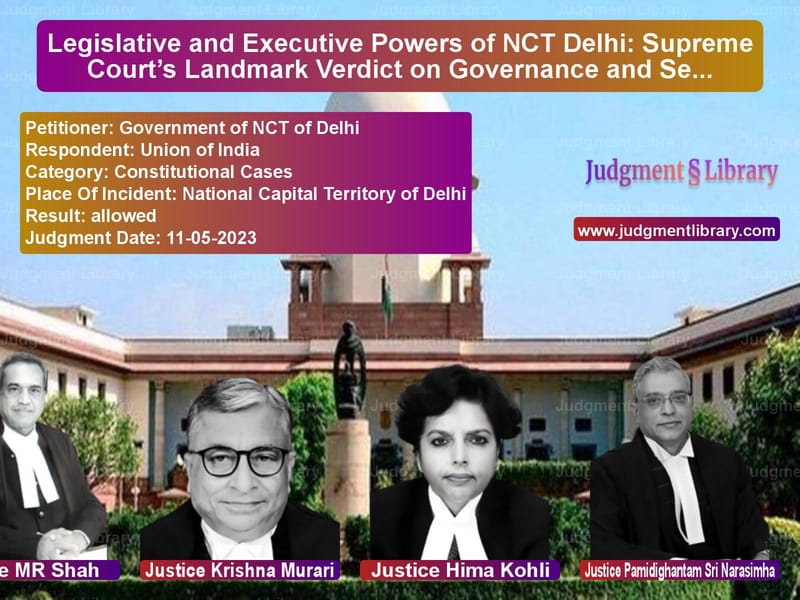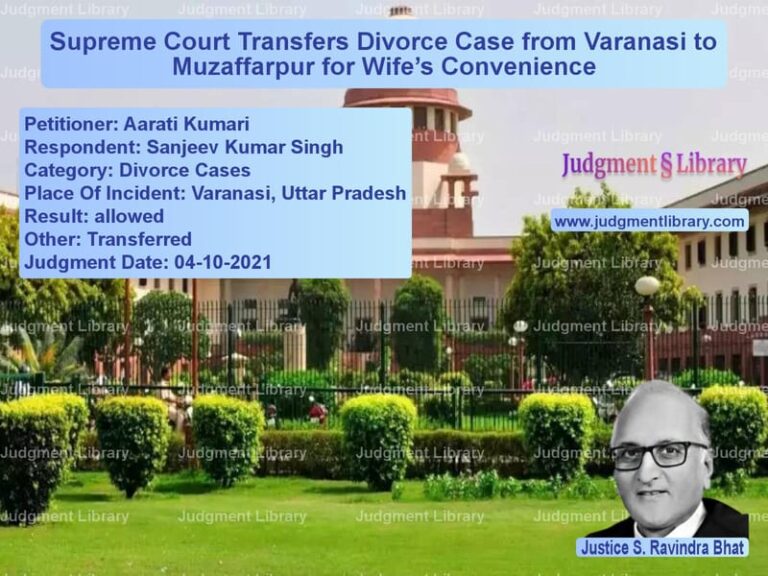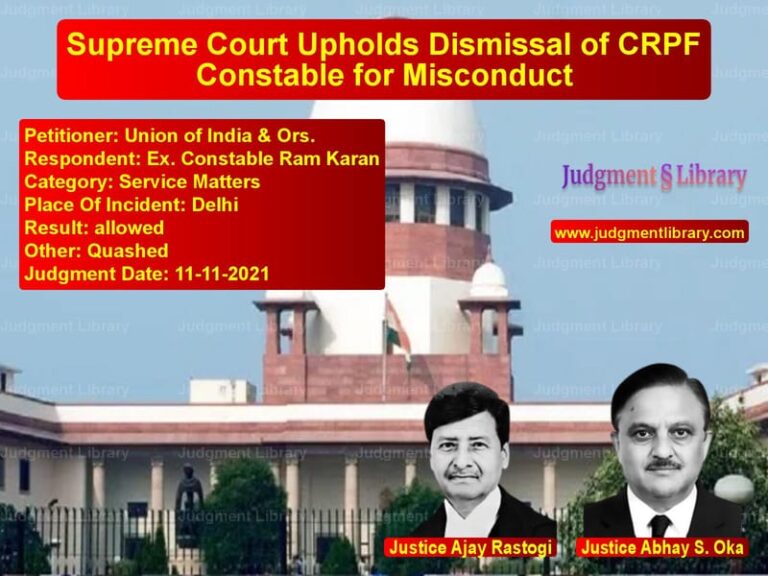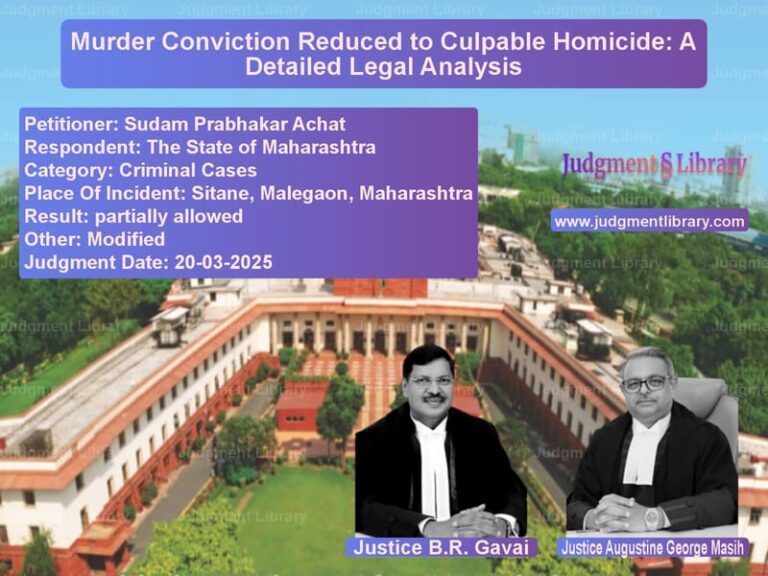Legislative and Executive Powers of NCT Delhi: Supreme Court’s Landmark Verdict on Governance and Services
The Supreme Court of India, in its significant judgment in the case of Government of NCT of Delhi vs. Union of India, settled the long-standing constitutional dispute regarding the governance powers of the elected government of the National Capital Territory of Delhi (NCTD) and its authority over services. The case centered on the interpretation of Article 239AA of the Constitution, which provides special provisions for the governance of NCT Delhi.
The Supreme Court ruled that the Government of NCTD has legislative and executive power over ‘services’ within its jurisdiction, except for matters related to ‘public order,’ ‘police,’ and ‘land.’ This verdict reaffirmed the democratic principle that an elected government must have control over its administration to ensure accountability and effective governance.
Background of the Case
The case arose due to the prolonged dispute between the Government of NCTD and the Union of India over the administration of services. While NCTD has an elected legislature and executive, its governance has often been challenged by the powers of the Lieutenant Governor (LG), an appointee of the Union government.
The issue escalated when the Government of NCTD sought control over services, including the appointment and transfer of bureaucrats working in the Delhi administration. The Union government contended that service matters should remain under its jurisdiction since Delhi is a Union Territory.
The Supreme Court was tasked with deciding whether the Government of NCTD had legislative and executive authority over ‘services’ in Delhi or if such power rested exclusively with the Union Government.
Legal Issues Considered
The Supreme Court examined several crucial legal issues:
- The extent of legislative and executive power of the Government of NCTD under Article 239AA.
- Whether ‘services’ fall within the jurisdiction of the NCTD government or the Union government.
- The role and powers of the Lieutenant Governor in the administration of NCTD.
- Whether excluding NCTD’s government from control over ‘services’ would violate democratic principles and federalism.
Arguments by the Petitioner (Government of NCTD)
The Government of NCTD, represented by senior advocates, argued that:
- The legislative and executive power of NCTD extends to all matters in the State List and Concurrent List, except ‘public order,’ ‘police,’ and ‘land.’
- The phrase ‘insofar as any such matter is applicable to Union Territories’ in Article 239AA does not exclude NCTD from legislating on ‘services.’
- As a democratically elected government, it must have control over its bureaucracy to ensure effective administration.
- The Lieutenant Governor should act as a constitutional functionary and must follow the aid and advice of the Council of Ministers except in specified circumstances.
Arguments by the Respondent (Union of India)
The Union government, represented by the Attorney General, countered the arguments by stating that:
- NCTD is a Union Territory, and its governance structure differs from that of a full-fledged state.
- Under the Government of National Capital Territory of Delhi Act, 1991, the LG has discretionary powers, and service matters must remain under the control of the Union government.
- The exclusion of ‘public order,’ ‘police,’ and ‘land’ from NCTD’s jurisdiction implicitly includes control over ‘services.’
- Allowing NCTD to control services could disrupt coordination between the Union government and Delhi’s administration.
Key Observations of the Supreme Court
1. The Unique Constitutional Status of NCTD
The Supreme Court emphasized that NCTD is neither a full-fledged state nor an ordinary Union Territory. It enjoys a special status under Article 239AA, which grants it legislative and executive powers akin to a state government in matters not explicitly excluded.
2. The Phrase ‘Insofar as Any Such Matter is Applicable to Union Territories’
The Court rejected the Union’s argument that this phrase limited NCTD’s legislative powers. Instead, it held that the provision is ‘inclusionary’ rather than ‘exclusionary,’ meaning it does not bar NCTD from legislating on subjects listed in the State List and Concurrent List.
3. Executive Power is Co-Extensive with Legislative Power
The Court ruled that the executive power of NCTD is co-extensive with its legislative power, meaning it extends to all matters where it can legislate. Therefore, since NCTD has legislative competence over services, it also has executive authority over them.
4. Role of the Lieutenant Governor
The Supreme Court clarified that the Lieutenant Governor is bound by the aid and advice of the Council of Ministers, except in cases where he is required to act at his discretion. The LG cannot function as an administrator overriding the elected government.
5. The Principle of Collective Responsibility
The Court reaffirmed that in a democratic setup, the elected government must have control over its administration. If bureaucrats are answerable only to the LG and not the elected government, it would violate the principle of collective responsibility under the parliamentary system.
Final Judgment
The Supreme Court ruled that:
- The Government of NCTD has legislative and executive power over ‘services,’ except for matters related to ‘public order,’ ‘police,’ and ‘land.’
- The Lieutenant Governor must act on the aid and advice of the Council of Ministers in matters within NCTD’s jurisdiction.
- The exclusion of certain subjects does not imply that other subjects are automatically excluded from NCTD’s legislative and executive domain.
- The ruling strengthens federal principles by ensuring that the elected government has control over its administration.
Key Takeaways
- Strengthening of NCTD’s Autonomy: The verdict reinforces Delhi’s status as a quasi-state, granting it control over services.
- Democratic Functioning: The elected government must have authority over bureaucrats to ensure effective governance.
- Limited Role of the Lieutenant Governor: The LG cannot interfere in day-to-day governance except in cases explicitly mentioned.
- Federal Principles Upheld: The decision maintains the balance of power between the Union and states, recognizing the special status of NCTD.
- Impact on Future Governance: The ruling provides clarity on governance issues in Delhi and could influence similar disputes in other Union Territories.
Conclusion
The Supreme Court’s judgment in Government of NCT of Delhi vs. Union of India is a landmark ruling that settles the contentious issue of governance in Delhi. By affirming the powers of the elected government over ‘services,’ the Court has upheld democratic principles and reinforced the constitutional framework governing the National Capital Territory.
Petitioner Name: Government of NCT of Delhi.Respondent Name: Union of India.Judgment By: Justice Dhananjaya Y Chandrachud, Justice MR Shah, Justice Krishna Murari, Justice Hima Kohli, Justice Pamidighantam Sri Narasimha.Place Of Incident: National Capital Territory of Delhi.Judgment Date: 11-05-2023.
Don’t miss out on the full details! Download the complete judgment in PDF format below and gain valuable insights instantly!
Download Judgment: government-of-nct-of-vs-union-of-india-supreme-court-of-india-judgment-dated-11-05-2023.pdf
Directly Download Judgment: Directly download this Judgment
See all petitions in Fundamental Rights
See all petitions in Constitution Interpretation
See all petitions in Legislative Powers
See all petitions in Public Interest Litigation
See all petitions in Separation of Powers
See all petitions in Judgment by Dhananjaya Y Chandrachud
See all petitions in Judgment by Mukeshkumar Rasikbhai Shah
See all petitions in Judgment by Krishna Murari
See all petitions in Judgment by Hima Kohli
See all petitions in Judgment by P.S. Narasimha
See all petitions in allowed
See all petitions in supreme court of India judgments May 2023
See all petitions in 2023 judgments
See all posts in Constitutional Cases Category
See all allowed petitions in Constitutional Cases Category
See all Dismissed petitions in Constitutional Cases Category
See all partially allowed petitions in Constitutional Cases Category







